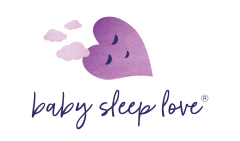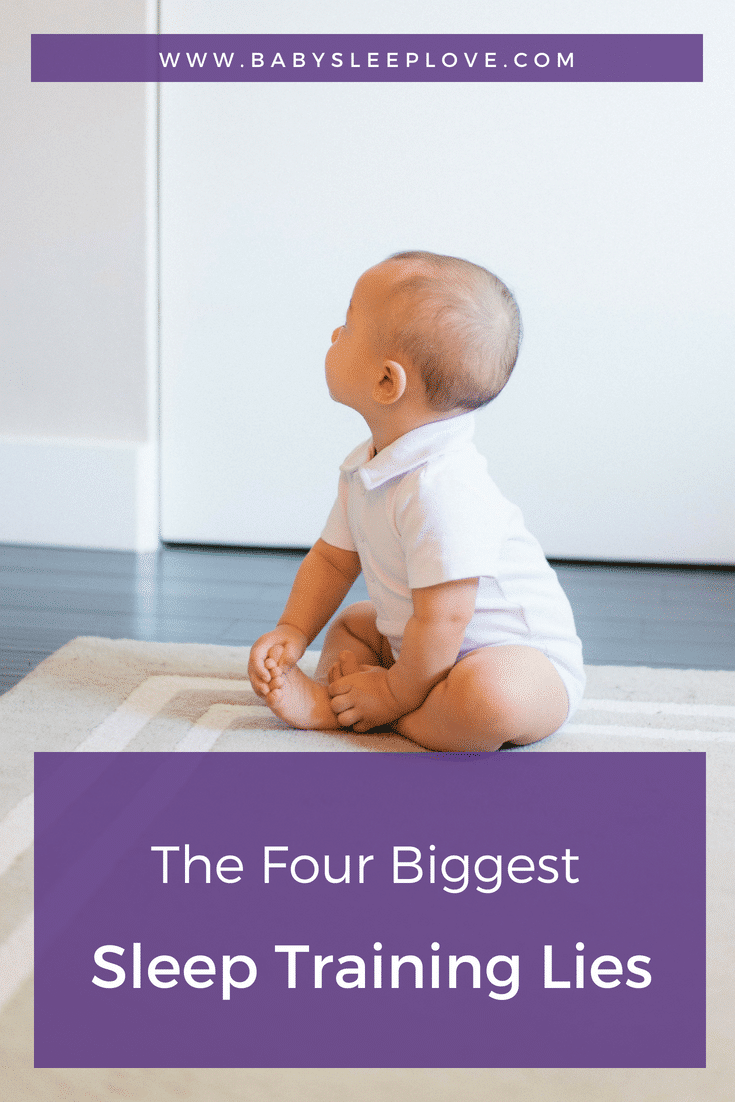
Baby Sleep Love
Certified Sleep Consultant
Before I delve into these strangely compelling sleep training lies and mistruths, I want to spend a brief amount of time on the term sleep training.
This can be a trigger term among some parents, because it tends to bring up images of neglectful caregivers who leave their crying baby behind closed doors without a care in the world. But in fact, there are a variety of methods you can use to improve baby’s sleep, and none need to include closing the door on your crying baby.
Everything else being equal, I prefer to use the term sleep coaching or even sleep learning. But whatever term you use, the intended goal is still the same – to get more sleep, both for baby and for you.
So, what are the 4 biggest sleep training lies?
Sleep Training = “Cry It Out” (CIO)
There are a vast variety of methods that sleep professionals and experts have created that are effective in helping your baby sleep better, that range from low/no tears methods (like Pick Up/Put Down, or The Sleep Lady Shuffle) to methods that require a higher tolerance for some crying (like Graduated Extinction). But CIO? This is often used as a blanket term to describe what some think is sleep training.
The problem with using this term is that it gives the impression that there is only one way to help your baby (and thus your family) sleep better, and that is to just let those babies cry. Lots of parents are understandably uncomfortable with this, and are looking for other solutions. There are so many ways to improve sleep and none are one-size-fits-all. A well-qualified sleep consultant will take your sleep goals and parenting philosophies into account before delivering a plan that is specifically tailored to your situation and specifically designed for your family’s sleep success.
Sleep Training will damage your baby
While research on sleep training is ongoing, the body of research built up to date indicates that it isn’t harmful to children. In fact, there is research to support that sleep training helps children become more well rested, and even has positive effects on maternal depression. Furthermore, there is a much larger body of research on the importance of sleep and the negative effects of chronic sleep deprivation.
Need more reassurance? One of my favourite studies on this topic is a systematic review of over 50 global studies, which concludes that not only is sleep training effective in improving babies’ sleep and families’ overall well-being, but also that babies are more secure, less irritable and cry less after sleep training. Parents’ well-being also improves after sleep training, particularly in the areas of mental health status, stress and marital satisfaction.
Sleep Training means you want to stop feeding baby so they “sleep through the night”
It is true that helping your baby learn to fall asleep independently will eventually lead to their sleeping through the night without unnecessary wakings, but this is often not the goal of sleep training for parents. When parents come to me for help with their baby’s sleep, they often mention that they are totally fine with continuing to feed baby once or even multiple times per night. They would just like to spend less time getting baby to finally settle down and sleep, both at the beginning of the night and after each feeding. They would like to teach their baby to sleep independently without relying on a number of sleep “props” that parents come to rely on (e.g., rocking, bouncing, squats).
If a parent would like help eliminating feeds, that is a question for their baby’s doctor. Generally speaking, if a baby’s doctor thinks baby is gaining well and has no other health issues or concerns, then at a certain age (of baby’s doctor’s choosing), parents can certainly work on eliminating unnecessary feedings. But sleep training does not have to mean that you stop feeding your baby overnight, especially if you have no problem at all with those moonlit cuddles. Baby sleep can improve dramatically while still maintaining nighttime feeds.
It is harmful to sleep train a baby that is younger than 6 months old
As long as you have the go-ahead from your baby’s doctor from a health and wellness perspective, there is no minimum age at which you can work on teaching independent sleep skills. Having said that, a well-qualified certified sleep consultant will most definitely employ different techniques based upon the age of the baby. Methods that will work for an 8-month-old are definitely not appropriate for a newborn, for example.
When I work with parents of newborns (or parents who are expecting), we work on creating healthy sleep habits from the beginning. We focus on baby’s sleep environment, the circumstances surrounding sleep, the routines and ‘signals’ that parents put into place to help baby learn what to expect, and very gentle methods of encouraging babies to fall asleep independently. The idea is that by establishing these habits early on, there will never really be a need to formally sleep train down the road, or there will be very minimal tweaking that will be required (usually around the time of the dreaded 4-month sleep “regression”).
Bonus:
One further thing I want to mention. I talk about sleep “props” above, which can run the gamut from feeding to sleep, rocking to sleep, bouncing on an exercise ball (my first daughter was addicted to this for many tiring months), to doing deep knee squats with babe in arms. It is completely understandable why parents start to introduce these methods early on. Sometimes parents don’t even realize that babies are able to fall asleep without these props, with just a tiny bit of encouragement.
We didn’t give our oldest daughter a single chance to settle herself to sleep as a tiny infant. I don’t think we even realized that could happen at all, and definitely not without tears. Other reasons a parent might resort to these things is simply because baby will not settle, no matter what else they do. We had to implement dear Dr. Karp’s 5 Ss on a regular basis during our oldest’s first 3 months of life, because she was colicky. But remember, if you don’t have a problem continuing to use these so-called props to help baby fall asleep, then you don’t have a sleep problem on your hands. It is only when these things become unmanageable that you should consider seeking help.
Join Baby Sleep Love on Facebook and Instagram.
Craving some step-by-step, personalized help with teaching your toddler to fall asleep on their own, and sleep through the night? I’ve got you covered! Take a look at our packages here to see how we can help.
